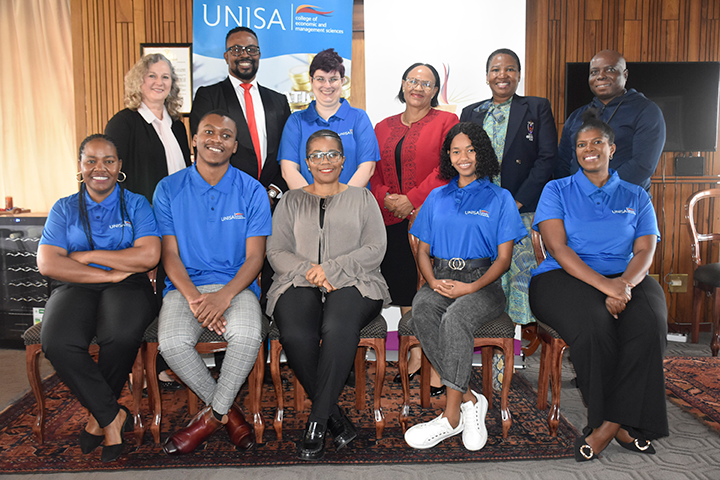News & Events
Unisa VC expresses pride in students heading to global challenge finals
Unisa Principal and Vice-Chancellor, Professor Puleng LenkaBula, recently met with four exceptional students from the College of Economic and Management Sciences (CEMS) to send them off with words of encouragement ahead of their journey to Chicago, where they will represent Unisa in the final round of the Spencer-RIMS Risk Management Challenge.

Front, from left: Millicent Mathoho, Kgothatso Phetla, Prof Puleng LenkaBula, Letta Tsholofelo Matlakala, and Nombuso Fortunate Sibeko
Back, from left: Prof Kerstin Jordaan, Dr Ntwanano Godi, Dr Suné Maré, Professor Eunice Seekoe, Dr Mantepu MaseTshaba, and Professor Hopolang Mashele
The VC expressed deep pride in the students representing Unisa and the college. She highlighted how their participation reflects the strength of the institution and its academic community. She said: “When there are competent, qualified, and committed scholars who are willing to mentor and nurture the next generation of scholars, our society and our university will do well and impact the world better. Projects such as participation in this challenge are a testament to the progress Unisa is making to ensure we can conquer the world.”
She encouraged the students to embrace every part of the experience, including constructive input along the way. “Look at feedback,” she said, “as that enables you to thrive, whether shared positively or negatively — it should never steal away your confidence.”
She went on to say that initiatives like this serve as evidence of the university’s growing global footprint. “As they say, the sky is no longer the limit, it is a frontier of research and therefore you must never think the boundaries and limitations are your destination; it is not,” she added. “When you return, you have value to share with other students so that they can know that these opportunities are available.”
Millicent Mathoho, Kgothatso Phetla, Letta Tsholofelo Matlakala, and Nombuso Fortunate Sibeko have earned a place among the top eight university teams worldwide and will present their research on climate risk at the prestigious RISKWORLD Conference, taking place from 4 to 7 May 2025 under the theme "Engage Today. Embrace Tomorrow."
Huntington, West Virginia – a culturally diverse city in the United States located at the junction of the Ohio and Guyandotte rivers – faces significant climate challenges due to its geographical position. The climate risk report, compiled by students, offers strategic recommendations and mitigation measures to help the city understand and address climate-related risks, aligning these efforts with its long-term goals. The report identifies key threats such as wildfires, heat, windstorms, landslides, and flooding, and provides well-researched strategies to strengthen the city’s resilience. These strategies support Huntington’s Plan2025 and its vision to "Look, Grow, and Connect" while promoting sustainable growth, community design, and infrastructure resilience.
Amongst those who came to wish the students well were Professor Eunice Seekoe, Acting Vice-Principal for Teaching, Learning, Community Engagement and Student Support at Unisa, Dr Mantepu MaseTshaba, CEMS Acting Executive Dean, Professor Kerstin Jordaan, Acting Director, School of Economic and Financial Sciences, Dr Ntwanano Godi, Chair of the Department of Finance, Risk Management and Banking, and Professor Hopolang Mashele, Chair of the Department of Decision Sciences.
The Internationalisation and Partnerships Office, Alumni Relations, and the Unisa Foundation played a key role in supporting students by sponsoring their daily allowances, visas, T-shirts, and blazers. Their continued support enabled the students to represent Unisa on a global stage.
The Spencer-RIMS Risk Management Challenge is a globally recognised competition that spans seven months and challenges university teams to develop a risk management strategy based on a real-world case study. The top eight teams are invited to present their work at RISKWORLD, the leading annual event for risk management professionals, attended by more than 12 000 experts from over 75 countries.
*By Tebogo Mahlaela, Communication and Marketing Specialist, College of Economic and Management Sciences, with additional reporting by Godfrey Tlale, Collaboration Officer, Strategic Partnerships, Special Projects and Alumni
Publish date: 2025/04/25
